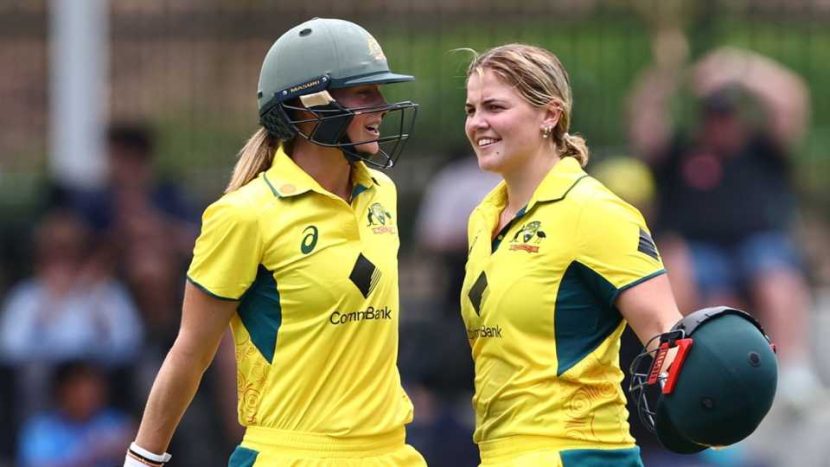“Expanding on the selecting-players-with-dubious-fitness thing, I’m not sure why the selectors aren’t using injury as an opportunity to blood new players,” says Rowan Sweeney. “Before too long all of Usman, Smith, Lyon, Boland and Starc will all be retired, and without some forward planning, or extreme good fortune, the crunch will be real. It seems […]


“Expanding on the selecting-players-with-dubious-fitness thing, I’m not sure why the selectors aren’t using injury as an opportunity to blood new players,” says Rowan Sweeney. “Before too long all of Usman, Smith, Lyon, Boland and Starc will all be retired, and without some forward planning, or extreme good fortune, the crunch will be real. It seems to me that bringing in a debutant to cover an injury is a great way to have, as you said earlier, a free hit. Who knows, giving players an opportunity to fully recover may even extend the careers of those players listed above…”
Debutants during high-stakes series though still have to be good enough to perform. So you go for your next-best player, I think. Boland has earned the right to be the next in line by being so consistently good when selected. His age is less important than having enough reserve players, whatever their age.
I think you’re right about there being a crunch coming, though. Hazlewood might not make it much longer with all these injuries. But when you’ve got great players who are still good enough, I think you largely have to keep picking them and take your chances somewhat with the next generation, who you develop as best you can the level down.
“Thanks for the great coverage of this series,” writes in Ivor Shapiro. “So I asked ChatGPT4 what Australia’s tactics might likely be in this situation. The first response was vague so I pushed back and got a longer, well-argued response with Gabba-specific factors ending with the following summary.”
If Australia starts their second innings with a lead of 180 runs, expect them to:
• Bat for 2-2.5 hours or about 30-35 overs.
• Score 120-150 runs aggressively.
• Declare with a target lead of 300-330 runs.
• Aim to bowl India out across 4.5 to 5 sessions.
Hmmm. I’m not a GPT believer, Ivor. Aside from the main problems with LLMs that they’re environmentally destructive due to computing power and ethically bankrupt due to stealing all of the information they’re trained on, they just make too many errors if you ask them for actual facts. They can be useful if you provide your own information and ask for it to be assembled in a certain format, but people are using them to search for information and they can’t return it reliably.
See the US pundits recently who used LLMs to search for prior examples of US presidents pardoning family members, then went on TV citing people who didn’t exist, like Woodrow Wilson’s imaginary brother in law Hunter de Butts. Yep.
This version will have been able to scrape enough articles suggesting that teams like to set targets of 300-plus, so it’s thrown that in there. So far so good. But how is anyone supposed to bowl out a team in five sessions when there would only be two sessions available on day five? That exposes the limitations. AI is a misnomer given there’s no actual intelligence in the code.
Plenty of rain incoming on the radar, by the way. We’re not looking good today.
“Pretty obvious Mitch Marsh not fit enough to play as all-rounder,” writes Ross McGillivray. “Is his batting good enough to warrant selection? As every footy fan knows, playing guys with injuries in big games is fraught with danger. You can’t just jab a guy’s ankle every day in a five-day Test.”
Can’t argue with the all-rounder bit, as discussed below. As for runs, I suspect Mitch Marsh is a player people are very fast to lose faith in. He was vital last summer, made big runs in all three Pakistan Tests, and Australia would have lost two of them without him. Then he made an important 40 in Wellington when the team was sinking, and a match-winning 80 in Christchurch that set up Carey to pull off that tough chase.
So I think he still has credits, made some runs second dig in Perth this year when Australia were stuffed, and he’s only batted once in Adelaide and once in Brisbane since. Reckon he does still command his place for runs alone, but needs some more pretty soon. It’ll be hard to keep Cameron Green out once he’s fit again.
An email from Tim Thomas: “Given the increasing unpredictability in weather patterns, is it time Test cricket took a page from the surfing world and extended the window for play. Playing 5 days of 7 or 10 with the option for some being called off due to rain or heat, seems like a nice way to ensure a result. Broadcasters and sponsors may never go for it but given how the rest of the week is looking in Brisbane, I think it’d be ideal.”
The issue, Tim, is that administrators are going the other way, wanting to squeeze Tests down to four days. More predictable, easier to schedule. Extended periods would never work because there are costs to having staff and stadiums on standby and those costs increase every day, whereas broadcast revenue for a Test match is a one-off fee for the match, no matter how long it goes. So every extra day is more expenditure against no increase in income, aside from gate receipts which would negligible by day six or more.
The modern schedule is already so crowded that they barely squeeze in two-Test series most of the time, much less series where matches were unpredictably a week or more. So, I like the idea (bring back the timeless Test) but it would be impossible. The WTC final has one reserve day if required, and that’s as far as we’ll get.
“What do you do in the third innings?” asks Ruth Purdue by email. “Block Bumrah and smack the other bowler and see where you get to, or block out the day? Make a game of it with risk of losing?”
I think if Australia had four bowlers they’d be much more inclined to do this. Marsh clearly isn’t reliably fit, despite their protestations, given they used him for two overs with Hazlewood missing. I don’t think they’d want to bowl much more than 50 overs given the workload for Starc and Cummins ahead of Melbourne. But then, Test cricket is tough and you never know when you’ll next be in a winning position. I think it’s worth going for it today, because surely on a fifth-day pitch with rain about they’re a chance to take a few Indian wickets early as they have done in all but one innings this series.
Of course, all that said, we’re currently losing overs again because of weather. So perhaps there’s no point and they might as well save their bowlers and use the day as a batting net.
I’ll tell you who this day’s play does matter to, once they get on. Usman Khawaja. Nathan McSweeney. Marnus Labuschagne. They all need to work their way into this series, Labuschagne’s fifty in Adelaide notwithstanding. They’re on a hiding to nothing, really, if they have to bat against Bumrah on a dark humid day with little to gain, but they have to treat it as a chance to put together a good innings without much riding on it. A free hit.
Here’s a new one. We have a lightning delay. Everybody is leaving the ground, even the ground staff and the camera operators. A big dark thunderhead is cruising by like a container ship.
Ten minutes for Australia to get ready to bat. Then 92 overs left in the day, rain permitting.
Cummins wants to spare his quicks, turns to a part-timer, and Head delivers immediately. Not from the slap through wide long off that yields two, but the defensive shot that drags Akash Deep’s back foot out of his crease, where the boot lodges on the line trying to get back. Some dip from Head that created that. Good bowling, but a quality innings from Deep.
78th over: India 258-9 (Bumrah 10, Deep 29) Lyon another over, they review for a bat-pad catch but there’s no contact.
77th over: India 257-9 (Bumrah 10, Deep 27) So there are 98 overs scheduled for the day, plus the one ball from Cummins (that over counts as part of yesterday). Two overs for a change of innings, if that doesn’t happen at lunch or tea, so two potential changes of innings from here means four overs. Take the total down to 94 overs. Every over India faces here is one less available to Australia for batting, or one less that India might have to face later.
Cummins bowls a snorter, moving off the seam. Bumrah fumbles at them, after Deep rotates strike with a push to point.
76th over: India 256-9 (Bumrah 10, Deep 27) Nathan Lyon rather than Mitchell Starc to start the day. I’d be getting Starc to fire down a yorker. Bumrah essays a sweep that misses the bat, but takes his arm, fine of leg slip for four leg byes. Runs be runs.
75th over: India 252-9 (Bumrah 10, Deep 27) Of course, Cummins only gets one ball, because they came off last night for bad light with five balls bowled of his over. Deep runs it into the cordon along the ground.
Here come Jasprit Bumrah and Akash Deep with the chance to do a little more thorning in Australian siding. And Pat Cummins with a chance at a five-for.
Here’s my wrap about how much fun it was yesterday.
Hello world. A fun fourth day despite the rain, as India saved the follow-on in dramatic and at times humorous circumstances. Who doesn’t love a last-wicket partnership against the odds? That partnership is unbroken, so Australia still have a wicket to get on this fifth morning, at which point there are three possibilities. One big, two remote.
Australia have to bat again regardless (or declare without batting). So they’ll probably just have a net and then have a little speculative bowl at India late in the day, given they’re down to three bowlers.
Or Australia could smash a hundred or so runs as fast as possible and put the target above 300 and beyond India, and try to bowl them out.
Or Australia could fall in a heap, thus setting India a target below 300, and India could have a shot at chasing it.
Probably more likely than that, it keeps raining sporadically and we get a wet draw.
One of the above, anyway. Or something even more boutique.
Shall we?














